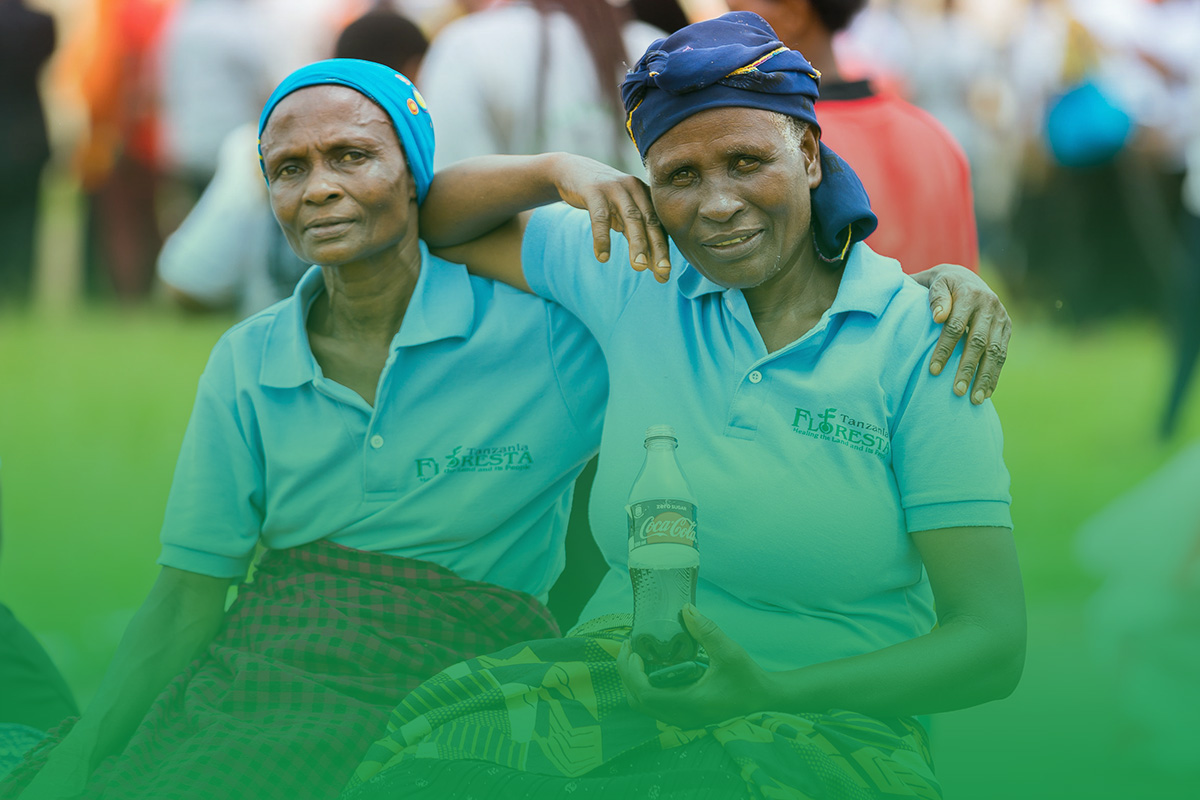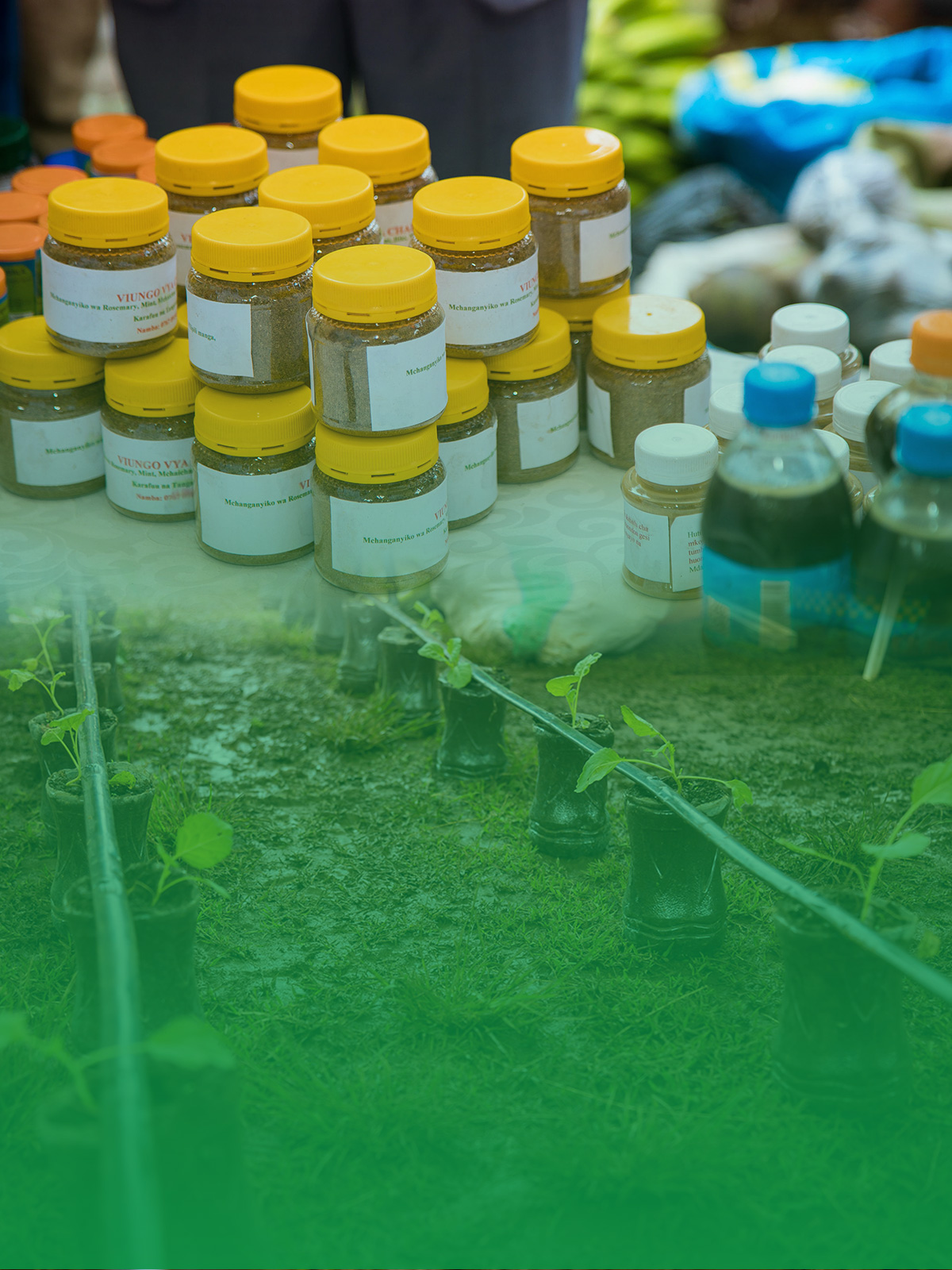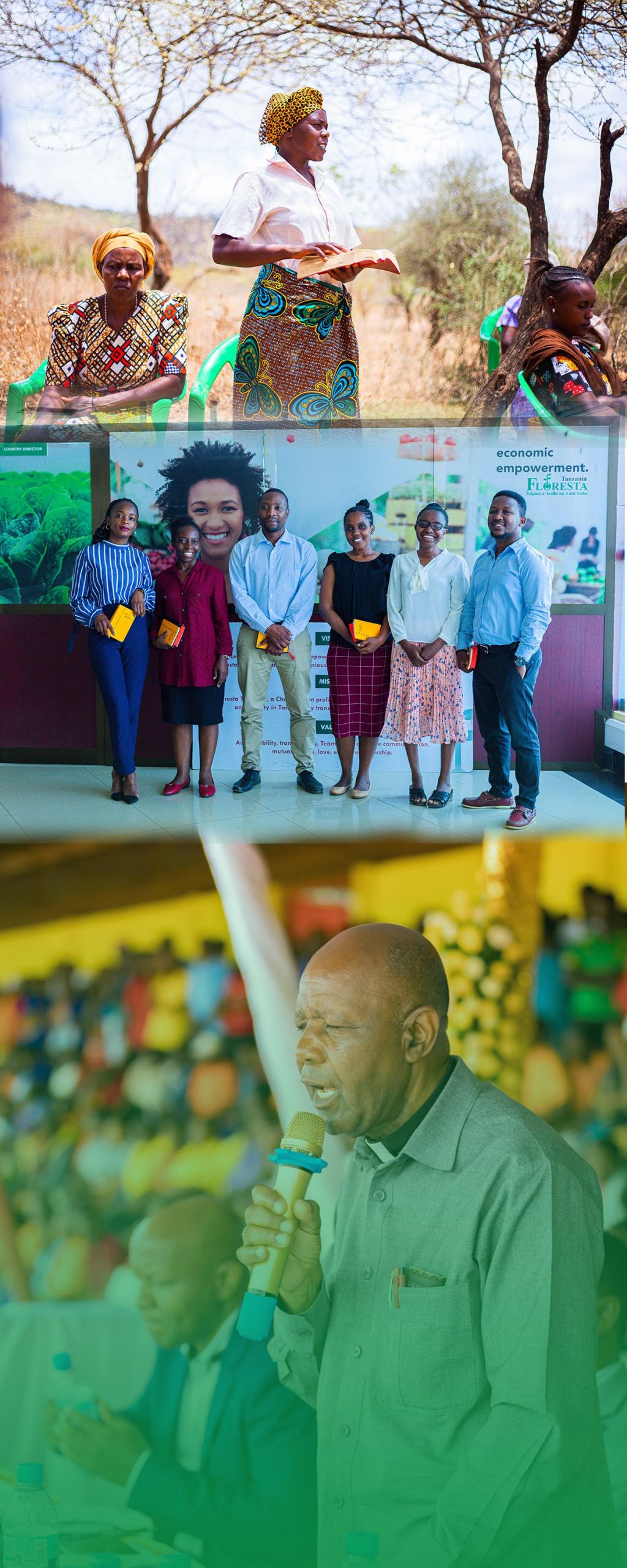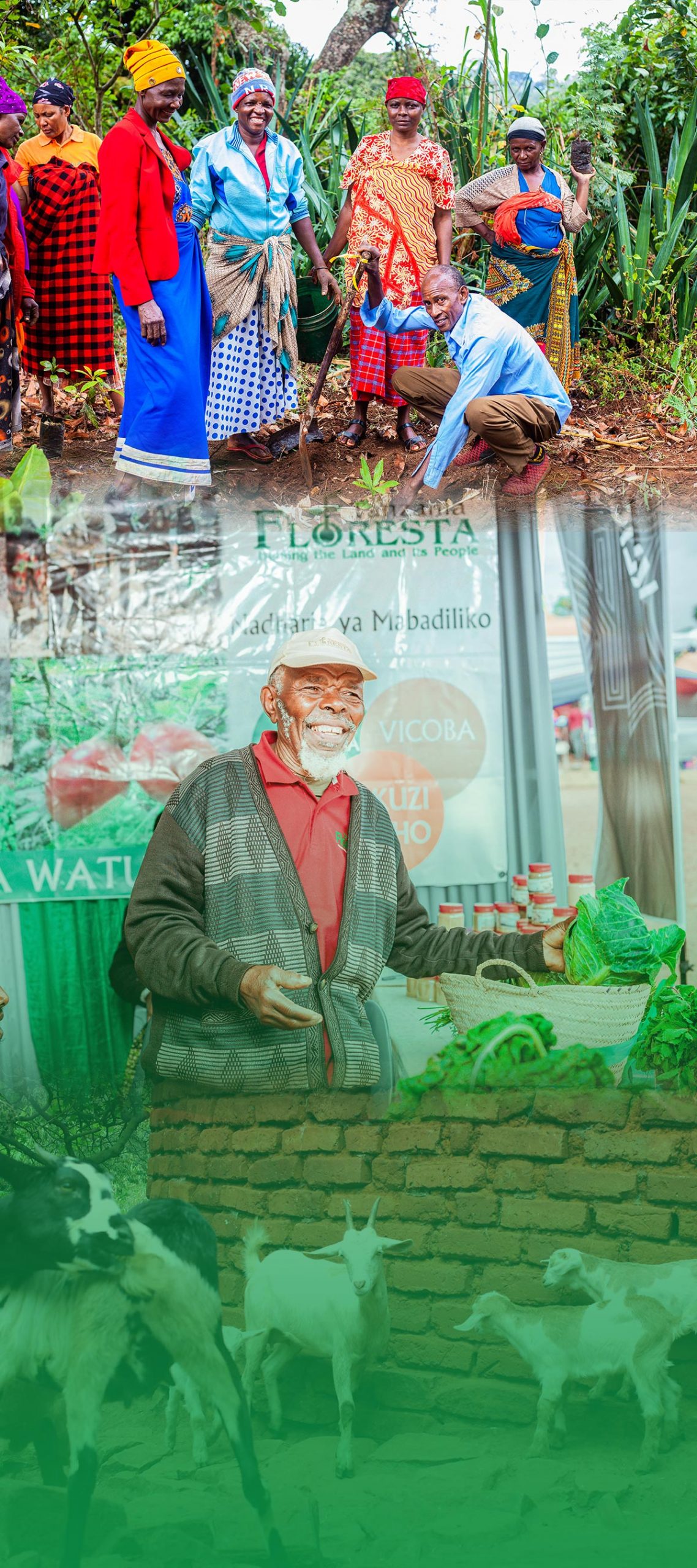
We teach: We believe that community development is the process of empowerment. Our programs encourage communities to take ownership of their own problems. We invest on people by teaching them how to fish rather than giving them the fish.

We Plant: We enable farmers to make the best possible use of their scarce resource, land inclusive to maximize production. Floresta promotes sustainable agriculture and agro-forestry techniques by assisting communities to optimize production in a sustainable way.

We create Enterprises: We enable our people to develop a culture of saving and lending to each other through village community Bank and start businesses.

Village Saving and Lending Association (VSLA)
Village Savings and Loan groups are the entry into Floresta programs. Members gather together to use the Village Savings and Loan system to help structure their household cash flows, support the community, and make strong financial decisions. These groups have been very popular and attract people from the entire spectrum of society.
Environment Restoration Training
Floresta’s programs encourage communities to take ownership of their own problems. We teach the VSLA groups about the connection between proper care and conservation for their local environments and building sustainable livelihoods. The groups then identify areas for further learning and we work with them build on the knowledge that the already possess. We are currently developing several Farmer Field Schools where we will identify those high performing farmers from among our Village Savings and Loan Association Village Savings and Loan Association (VSLA) groups. We will partner with these lead farmers to help them become experts in the things that they’re already doing well. These Farmer Field Schools will be very visible in the community and help spread some of our core teachings. We understand that a normal human behavior is that most people will watch the few early adopters of new teaching and technologies and only take them on after they’ve seen success. These Farmer Field Schools are one technique to impact whole communities.


Environmental Conservation
We partner with communities to help restore local environments, through sensitization that are normally done at village meetings. We help the communities utilize technologies and techniques that address their everyday needs in an environmentally sustainable manner.
Tree Nurseries:
Floresta through VSLA groups has helped establishment of 393 active communities owned and managed tree nurseries. Through these nurseries about 1,500,000 trees seedlings are being raised and planted by community members annually.
Bee keeping project:
About 12,000 beneficiaries have been trained on beekeeping and honey value additional for bio-diversity restoration across the Kilimanjaro region.
Contours:
Floresta encourage farmers to build contours in hillside areas. Contouring helps to improve soil fertility as it prevents soil erosion. In turn this directly impacts food production and helps to secure access to basic nutrition within the community. The impacts of the particular department towards the community: The department had successfully impacted the community through restoring more than 500 hectares with trees and bio-diversity and revived 394 water sources and 247 alternative water sources along with maintaining about 641 water sources across the Kilimanjaro region
Economic Development
We work with farmers to make the best possible use of the resources that they have, while at the same time identifying alternative sources of income to supplement their farming practices.
Organic agriculture: We encourage all farmers involved in any Floresta programs to build bio-intensive gardens at their homes. These “double dugs” utilize household compost and integrated pest management techniques to grow healthy fruits and vegetables without relying on commercial pesticides and fertilizers. Research has shown that childhood malnutrition in Tanzania is largely due to the lack of a diverse diet. Communities who utilize these gardens have access to diverse sources of nutrition without increasing food costs. In partnership with USAID, we are working to implement the Improved Livelihoods through Organic Agriculture project. The goal of this project is to build on the success of the bio-intensive gardens to build and strengthen markets for this organic produce. We’re currently working with several exporters of beans, peas, babycorn and avocado to export some of our excess produce to the European Union. We haven’t yet reached a point where we can certify our produce as organic and reach external markets, but we are still working to reach this goal. Livestock and poultry: Members of the Village Savings and Loan Association (VSLA) groups save money regularly and can access loans for business investment and household improvements. Many members choose to invest in livestock and poultry businesses. Floresta helps to work with these households to get the most out of these businesses. We also have a lot of expertise on livestock and can help the farmers when they request assistance. This is just one way that we help communities diversify their economies.


Outreach and Spiritual Renewal Ministry
Floresta works with local religious institutions (churches and Mosques) to equip communities with skills needed to address human needs using locally available resources. We realize that religion is a major instrument of change in the community and we encourage them to partner with us in our work since we believe poverty and deforestation have a relation with spiritual issues caused by the broken relationships between man, environment and God.
We equip religious leaders and local leaders with knowledge on how to care for environment with reference to the script “God has called us to care for our environment and communities and cares deeply about how we interact with the world around us. For the earth is the LORD’s and everything in it, the world and all who live in it (Psalm 24:1)”. We are not limited to only religious institutions but also schools and as of current we have managed to form partnership with 259 churches, 5 mosques and 235 schools from which we established FFS, tree nurseries and vegetable gardens.
Floresta works with schools and school environmental clubs to promote the environmental restoration activities. Establishment of FFS and tree nurseries in schools have helped the production of vegetables and planting trees at school compounds. The great achievement is that students have been transforming the technologies to their households. We mobilize institutions (churches, mosques and schools) to participate in tree planting campaigns as one of the Floresta initiatives in the course of reversing the deforestation.
Bible clearly state that God put the man in the Eden garden to take care of it, cultivate and produce, and God himself was the owner of the land and the first farmer therefore humans have been given the role of taking care of the land and sustaining the production. Communities have been reminded on the lesson and the importance of valuing the work they do (farming) is good use of their talents from God and not otherwise.
Helping the needy
Floresta through outreach and Spiritual renewal department encourages the importance of extending a helping hand to the needy. VSLA groups and partner institutions have been trained about God’s love and sharing the God’s blessings with their neighbors.
Transformations achieved
It is challenging to quantify spiritual renewal changes, however; we make some discussions with our partners that can indicate the impact of how things are changing in the communities, including changed mindsets. The discussion is made around how the communities can solve their problems using their own resources, attitudes, improved relationships, feeling a sense of purpose at work, and using of the talents.
KPI’s
- Church partnerships
- Spiritual Leadership training days
- Number of times helping neighbor
- I feel pride in the work I do
- I have the capacity to improve my life
- My community works together to solve problems in my community
- Floresta staff treat me with respect
Agriculture and livestock keeping
Floresta’s programs develop farmer’s capacity through trainings that are tailored to farmer’s needs. The organization preserves local and natural ways of farming by promoting existing indigenous knowledge. The knowledge is disseminated to community members through lead farmers and VSLA groups where farmers learn from their fellow successful farmers. The organization believes that farmers learn and adopt new technologies better and fast through their peers. We work hand in hand with the community in testing different technologies, giving farmers the ownership of the trials in their farmers’ field school (FFS) and the adoption / implementation in their farms and gardens.
Farmers Trained
The organization train farmers on module of the core agro-ecology curriculum which is Soil Conservation, Agro-Forestry, Bio-intensive Agriculture, Soil Fertility, Conservation Agriculture and Watershed/Ecosystem planning. Trainings are delivered according to the training sequencing guideline and critical assumptions laid down in the training curriculum. The trainings positively contribute to improving farmers’ lives through increased crop yield and restored environment. The theory session in each module takes 8 hours (one day) and practical session 8 hours, conducted in the farmer field schools (FFS).
FFS is a piece of land set aside for learning purposes, where farmers come together, share experience and test various farming techniques. FFS has been an important tool in speeding up application and adoption of various technologies taught by Floresta Tanzania. Participants in the FFS learns by doing and observe the performance of those technologies. Groups that have received long day training will continue to receive short day trainings during normal VSLA weekly meetings, to deepening their understanding and troubleshoot any challenges that may arise.
Livestock keeping
Livestock keeping especially Dairy Goat is the project that was introduced to farmers group/vsla group with the aim of recognizing best performing farmers in environmental conservation activities and sustainable farming. Each group is provided with 4 goats, 3 female and 1 male respectively. Group members are required to nurture them until they reproduce after which every member is required to give 2 offspring to other group members.
Monitored is done by using record keeping exercise book which is kept by every project beneficiary. The exercise book is required to keep records of all treatments administered to the Goat, vaccines, mating history, reproduction history, pass-on and death reports. The project is also monitored through spot checks whereby Floresta staff visits the project and fills spot check form. All records about the project are kept in a special inventory called goat project inventory that tracks every information related to the project.
To date the project has 703 beneficiaries with 967 Dairy Goats in all watersheds, and farmers are being trained on goat husbandry zero grazing to ensure they see the value of the goats. The trainings are not limited to goats but also on cattle keeping and poultry keeping which is currently on high demands. The organization through the department have created strategic partnership to enable farmers to get the right breeds of local chicken.
